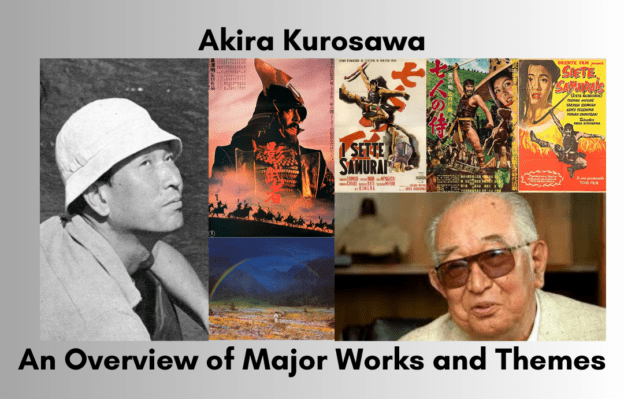Check out my artical on the works/films of Akira Kurosawa, and the themes he commonly threaded through them.
Major Works:
- “Rashomon” (1950) – A psychological thriller that presents multiple perspectives of a crime, challenging the nature of truth and human honesty.
- “Seven Samurai” (1954) – An epic tale of a village hiring seven ronin (masterless samurai) to protect them from bandits.
- “Throne of Blood” (1957) – A retelling of Shakespeare’s “Macbeth” set in feudal Japan, exploring ambition, betrayal, and fate.
- “The Hidden Fortress” (1958) – Focuses on two peasants who escort a man and woman across enemy lines without knowing they are a general and princess.
- “Yojimbo” (1961) – About a wandering samurai who arrives in a town ruled by two feuding crime lords, manipulating both to his advantage.
- “High and Low” (1963) – A crime thriller about a businessman’s moral dilemma when his son is mistaken for another boy and kidnapped.
- “Ran” (1985) – A reimagining of Shakespeare’s “King Lear” set in medieval Japan, dealing with themes of chaos, ambition, and betrayal.
Central Themes:
- Morality and Human Nature: Kurosawa often delved into the depths of human nature, exploring the conflicts between good and evil. “Rashomon” is a prime example, as it examines the fluidity of truth and human self-deception.
- Social Justice and Class Struggle: Films like “Seven Samurai” and “High and Low” present a deep societal divide, with samurai and businessmen representing higher status, while farmers and kidnappers represent the downtrodden or morally ambiguous.
- Heroism and Individuality: Whether it’s the lone samurai in “Yojimbo” or the collective efforts of the “Seven Samurai,” Kurosawa’s characters often display a mix of individualism and teamwork.
- The Chaos of Life and Fate: Both “Throne of Blood” and “Ran” emphasize the unpredictable nature of life and the consequences of human ambition, intertwining fate and human agency.
- War and Conflict: Whether it’s the interpersonal conflicts in “Rashomon” or large-scale battles in “Ran” and “Seven Samurai,” Kurosawa delved into the causes, nature, and consequences of conflict.
- Adaptation and Influence: Kurosawa had a penchant for blending traditional Japanese stories with Western influences, especially borrowing from authors like Shakespeare and Dostoevsky.
Kurosawa’s legacy is one of masterful storytelling, innovative techniques, and profound philosophical inquiries. With a deep understanding of both Western and Eastern narrative traditions, he crafted films that resonated across cultural boundaries, making him one of the most universally acclaimed directors in the history of cinema.
